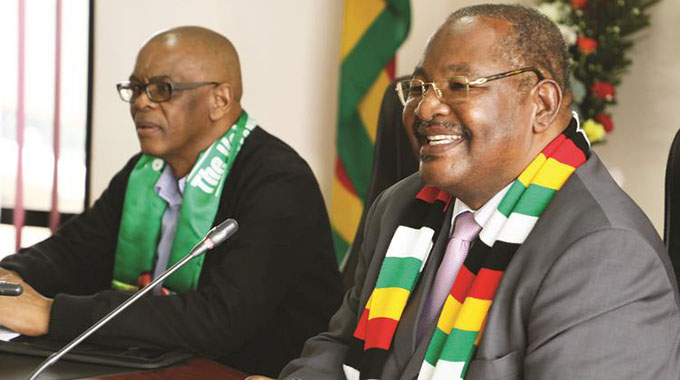‘Africa must learn from past experience’

Farirai Machivenyika Senior Reporter
Africa must learn from past experience and knowledge to chart its future development and the improvement of the livelihoods of the continent’s citizens, President Mnangagwa said yesterday while launching the first edition of the African Fact Book at State House.
The book was compiled by the Institute of African Knowledge with the support of the Office of the President and Cabinet, Research Council of Zimbabwe, six ministries, the private sector and regional and international organisations.
The first edition was published under the theme; “Busting the myths”.
In his remarks, President Mnangagwa challenged African intellectuals and the media to lead in writing and popularising the continent’s own stories.

The President is shown slides at the launch of a Mobile Museum of African Liberation by Ambassador Muzavazi while Ambassador Mbete, Home Affairs and Cultural Heritage Minister Kazembe Kazembe (partly obscured) and Ambassador Mubako follow proceedings. — Picture: Tawanda Mudimu
“Furthermore, let us draw from our African heritage and knowledge to develop new technologies, innovations and systems that will improve our agriculture practices, accelerate the industrialisation and modernisation of our economies, and ultimately lead to a better quality of life of our people,” said President Mnangagwa.
He said the achievements of the continent’s ancestors should inspire current generations to reclaim Africa’s place in science, technology, innovation, research, culture and politics.
The President said the African Fact Book will contribute towards the cultural, educational, mental and economic emancipation of Africans.
“The continued narratives and myths which must be debunked vary from time to time and across generations,” he said.
“Some purport that the people of Africa have no history and that our colossal monuments were not built by us, the indigenous local people. Other myths assert that Africans are not innovators, discoverers and inventors. All these have been undeniably deconstructed by scientific facts, impeccable sources and astute scholarship.”
He said the African Fact Book shows some of the origins of the world’s inventions and discoveries that came from Africa.
The book shows that the pyramids were built by the continent’s forefathers while the Dogons of Mali, experts of astronomy, space and stars, existed hundreds of years before Nicolaus Corpenicus.
Said President Mnangagwa: “We further learn that the greatest traveller of the middle ages was in fact Ibn Battuta of Morocco, who wrote a book that was used by many explorers including Christopher Columbus as reference for exploratory maps and cartography.”
President Mnangagwa added that other fields such as the study of mathematics, art, language and mining were heavily influenced from Africa.
The African Fact Book also demonstrates how Africans have always been peace-loving people who always sought human progress and neighbourly co-existence.
Speaking at the same occasion, South African President and African Union Chairman Cyril Ramaphosa, who was represented by South African ambassador to Zimbabwe, Mr Mphakhama Mbete, endorsed the launch of the book.
In his foreword to the book, President Ramaphosa said the history of people and their cultures could only be told through stories.
“Some stories are well known some are still to be told. For centuries, the story of Africa has largely been told by others, especially those who have taken over our land and subjugated our people. The time has come for the African voice to be heard and champion the African cause,” he said.
President Ramaphosa added that the African Fact Book was work borne out of 600 years of silence by Africans while other people spoke on their behalf.
He said a lot of misleading myths about Africa have been propagated including that it is a place of endless wars, and hunger with little opportunities for success.
President Ramaphosa commended the African Fact Book for correcting some of the myths about Africa.
The Institute of African Knowledge chairperson, Professor Simbi Mubako, said the book had a special message for Africans.
“For the African reader it is important to note that for the most part, information about Africa has been written and taught by non-Africans and these non-Africans wrote the views of Africa in their own perspectives. As a result, most Africans view themselves through other peoples’ lenses,” he said.
There was need for Africans to tell their own story and the African Fact Book was one such initiative.
The book was put up together in line with the African Union’s Pan-African Vision, Agenda 2063, and Aspiration Five, which seeks to enhance the strong cultural identity, common heritage, values and ethics of Africa.
It was conceived after the African Union Commission, which was then chaired by Dr Nkosazana Zuma, recommended that Zimbabwe leads the way in coming up with such a book after she had been impressed by the country’s celebrated African Book of Records.
The AU, after sending a delegation to assess the capacity of Zimbabwe to produce the book, declared and adopted the African Fact Book as a reference educational tool for African nations.
President Mnangagwa also launched the Mobile Museum of African Liberation, a precursor to the Museum of African Liberation set to be established in Zimbabwe.
It is endowed with high-tech equipment where visitors can interact with the history of Africa and the victory against colonialism and imperialism.









Comments